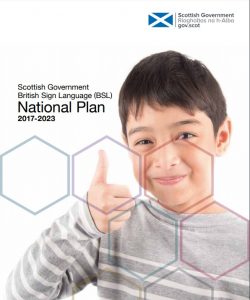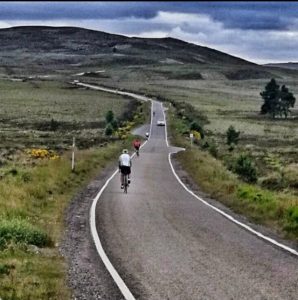In this blog Margaret McKay explores the role of the British Sign Language National Plan 2017 – 2023 and the part that it can play in further legitimising British Sign Language (BSL) as an indigenous language in Scotland and on a wider basis across the UK.
Through a language lens, not a disability lens
The British Sign Language (BSL) National Plan 2017 – 2023 was passed in Scottish Parliament in October 2017, it is a first for the UK, and leads the way in the mainstreaming of sign languages across the globe. It sets out Scotland’s ambition to be the best place in the world for BSL users to live, learn, work and visit, and includes 70 actions to help achieve the goal. The premise is that D/deaf and/or Deafblind people will be wealthier, smarter, healthier, safer and stronger in Scotland whilst at the same time promoting BSL as an indigenous language to everyone.

The focus of the BSL National Plan adopts a social model and aims to redress the balance, where BSL is viewed through a ‘language lens’ not a ‘disability lens’, and recognises the rights of D/deaf and/or Deafblind people whose first or preferred language is BSL. Based on principles of collaboration and partnership, the Scottish Government have tasked organisations such as British Deaf Association Scotland, Deaf Action, Deafblind Scotland, deafscotland and National Deaf Children’s Society Scotland to help foster a greater understanding of deaf culture in the wider communities and to work with public bodies to work towards embedding BSL culture into everyday practice and to promote as a vibrant and living language.
Redressing the balance
The Deaf Action launch of the BSL National Plan highlighted the fact that D/deaf and/or Deafblind people are more likely to experience ill health, leave school with fewer qualifications or struggle to find access to employment as a result of lack of linguistic access. The BSL National Plan aims to address this issue holistically, incorporating all aspects of life in Scotland and engaging all sectors (culture, leisure, sport the arts, justice, transport, health/social care, education from early years through to FE and HE and also employment.
Expectations
Colleges and universities in Scotland are expected to their create their own local draft plan and in doing so they are expected to:
- Ensure that they consult with D/deaf and/or Deafblind people and those who represent them on the development of the draft plan,
- Include information about tactile BSL communication to support people who are Deafblind,
- Ensure that the content is accessible, creating it in BSL and English.
The Scottish Government Equality Unit have drafted a brief guide for colleges and universities which must be published by October 2018.
Scoping the horizon
So how can we inspire and be inspired, and help create innovative and engaging ways to amplify Deaf culture to support the educational and social needs of D/deaf and/or Deafblind people in general in our colleges and universities?
Deaf culture to support the educational and social needs of D/deaf and/or Deafblind people in general in our colleges and universities?
Maybe your institution is already engaged in projects to promote and raise awareness of inclusive practice when designing services for people who are D/deaf and/or Deafblind or maybe you are involved in collaborative work with D/deaf communities to improve your institution’s services, to influence the design of the curriculum to ensure it is accessible for Deaf people. Being a Jisc service it goes without saying that we are interested in the role of technology to support independent learning and inclusive practice – maybe you are using technology in interesting ways to convey information in more engaging ways or adopting strategies to ensure that digital content is accessible for D/deaf and/or Deafblind people. You might have Deaf learners who are using technology in interesting or innovative ways to improve their experiences or enhance their learning. If so we’d love to hear from you!
Over the course of the next few months we’d like to invite you to share ways that your institution is supporting the evolution of BSL in your college or university. And remember, just because this is a Scottish initiative, it doesn’t mean that you need to be based in Scotland to get involved in sharing your practice or learning more about what’s going on. From our experience working with FE/HE across the UK we know that there are excellent examples of practice across the country and we’d love to hear more. Please email Margaret McKay our subject specialist (inclusion) to get involved in telling your story.
In the meantime, look out for our forthcoming guest blogs to hear from colleagues across the sector and from Deaf organisations to learn more about what’s going on out there.
